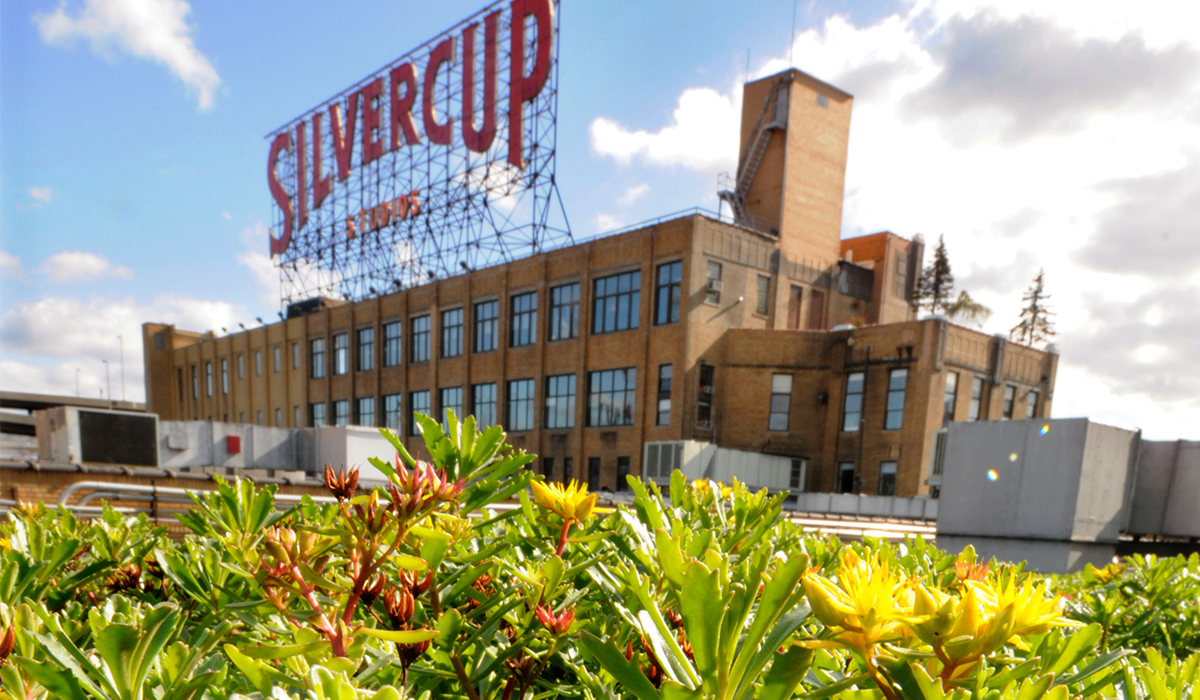Courtesy of Gregg Goldstein, Variety.
With climate change and pollution making environmental concerns more urgent than ever, studios and productions are taking a lead role in incorporating sustainability into the workplace. And in some cases, it’s a necessity.
As New York City experiences a boom in studio construction, for example, recent legislation requires most buildings that exceed 25,000-gross-square-feet to meet new energy efficiency standards and reduce greenhouse gas emissions by 40% by 2030 and 80% by 2050 through solar panels, green roofs and other methods. “Studios have a unique opportunity with green roofs, because we’re typically low buildings with flat roofs,” says Silvercup Studios director of studio construction and capital projects Josh Sager.
Sager, a New York City department of environmental protection vet, is more familiar with the topic than most. He notes that Silvercup was one of the first adopters of green roof technology in 2005. “It helps clean the air, reduce storm-water runoff, lower energy consumption and reduce the ‘heat island effect’” found in urban areas, he says.
Robert Halmi’s Great Point Media is taking a novel approach to sustainability at its Lionsgate Studios Yonkers and Great Point Studios Buffalo in upstate New York, as well as its upcoming Atlanta and Newark, N.J., studios, by creating organic gardens on their green roofs for the food they serve. “In Wales, we’re building habitats for bees on the top of our stages to rebuild what we’re disturbing by creating the stages in the first place,” Halmi says of the Great Point complex in Cardiff, Wales.
And since a sustainable studio is arguably one that’s built to survive climate change-induced flooding, Robert De Niro’s new Wildflower Studios, opening in Queens next summer, certainly qualifies.
“The entire structure is elevated one story, and all of the power and vital equipment was moved up to the roof,” says managing partner Adam Gordon. “So in a Hurricane Sandy[-style] event, water could wash in and out of the garage, while soundstages above are completely unaffected.”
Most of Wildflower’s roof has solar panels, and it uses LED technology that “generates much less heat, an important component of heating and cooling buildings like this.”
Who better to ask about sustainability than Sustainable Studios COO Gavin Curran? “We use green energy and solar panels on the roof,” he says of the two-year-old Moonachie, N.J., outfit. “I’d love to explore wind power turbines, [since] there are new quieter ones. We’re working with local communities to recycle and give away wardrobe, hair, makeup, props, sets, lumber — anything we can, We also retrofit our building, instead of clearing land and setting up a new one or knocking one down.”
As Silvercup’s Sager notes, the amount of carbon produced from a renovation is “astronomically less” than with new construction.
There are several resources for filmmakers looking to make their sets green. For example, they can attend the Sustainable Production Forum, which holds conferences in New York, Los Angeles, Vancouver and Toronto. “What we’re looking to do is accelerate sustainability and decarbonization by providing folks that work in film and television with tools, skills, understanding about industry baselines, knowledge about where they can find resources and who they can get those resources from,” says founder Zena Harris.
One such resource is Brooklyn, N.Y.-based Earth Angel, which reduces the environmental impact of productions by donating food, managing crew waste and implementing energy efficiency and fuel reduction strategies. Series like Showtime’s “Billions,” limited series like Amazon’s “The Underground Railroad” and films like “Avengers: Infinity War” have hired them.
Atlanta-based Electric Owl Studios works with Earth Angel, along with Rescuing Leftover Cuisine to redistribute extra food from sets, Cherry Street Energy for solar panel power, the Lifecycle Building Center to capture building materials for community reuse, and Live Thrive’s Center for Hard to Recycle Materials (ChaRM) to divert hazardous household waste and other items from local landfills and water systems. Studio co-founder Dan Rosenfelt says his company uses nontoxic cleaning supplies, solar-powered golf carts and solar panels that offset 30% of their energy consumption. He plans to break ground on a Hastings-on-Hudson, N.Y., branch of Electric Owl early next year, aiming for a mid-2025 opening.
“We hope to offset at least 60%-70% of our overall energy consumption there” with solar panels, Rosenfelt says. “And we’ll continue to work with most of these incredible partners.”


